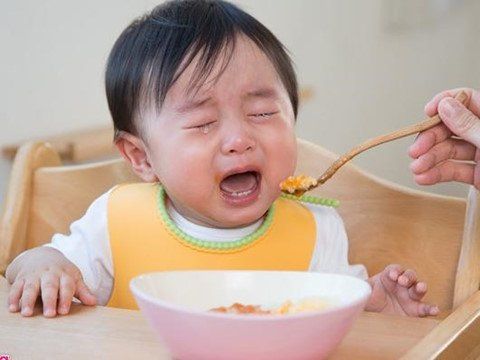This is an automatically translated article.
The article was professionally consulted by resident Doctor Ho Thi Hong Tho - Neonatologist - Pediatrics - Neonatal Department - Vinmec Phu Quoc International General Hospital.If not noticed and treated early, long-term constipation in young children disrupts the function of the colon, causing wastes not to be eliminated. The failure to eliminate toxins for a long time can cause rectal inflammation and the risk of colon cancer.
1. Diagnosis of constipation in children
Constipation is a condition in which bowel movements are difficult, take a long time to pass, and the interval between bowel movements is longer than usual. This can be a sign of an unhealthy digestive system.Constipation is very common in children because the digestive system of newborns is not yet fully developed, so the baby is very susceptible to digestive disorders. Constipation can greatly affect the health of the baby, causing anorexia, stunting, growth retardation, malnutrition..
Most of constipation in children is functional constipation (90-95%). The factors that contribute to functional constipation are diverse, including:
Children's natural tendency: Some children have slow bowel movements, causing constipation Behavior withholding stools: Children are busy playing, holding fast Demand makes the stool bigger and harder, causing pain after defecation, the more children avoid going to the toilet, the more painful the next time. Due to the new toilet environment (new school children). Effects of diet because some children tend to be constipated easily, if they eat less fiber, they will be more prone to constipation. Constipation due to pathology: Some diseases cause constipation in children such as Hischsprung's disease, hypothyroidism, cystic fibrosis, some neurological diseases, side effects of some drugs to treat diseases in children... Constipation in infants Birth may be due to the influence of the mother's diet if the baby is breastfed or to the infant using formula. Diagnose constipation in children if the child has at least 2 of the following signs:
The child has less than 3 bowel movements per week, the stools are small, hard or broken like goat poop. Children with constipation will have very solid stools, feel very strained and strain, and pain when they have a bowel movement. Children anorexia, abdominal pain, abdominal distension leading to growth retardation; Constipation in infants is often fussy, stop feeding. The stool may be bloody because of anal fissures and the stool will have an unpleasant odor. Children have abdominal pain in the stomach area, reducing and eliminating abdominal pain after having a bowel movement.

Táo bón xảy ra có thể là dấu hiệu cảnh báo hệ tiêu hóa không khỏe mạnh.
2. Consequences of prolonged constipation in young children
If not noticed and treated early, long-term constipation disrupts the function of the colon, causing the waste products not to be eliminated. The failure to eliminate toxins for a long time can cause rectal inflammation, carcinogens accumulate in the colon and rectum, which will lead to colon cancer.Prolonged constipation in children, if mothers let this situation last without timely treatment, it will lead to serious consequences affecting the health and psychology of children such as:
Anorexia: Constipation causes the accumulation of faeces to not come out, causing abdominal distension, bloating, making children lose their appetite, anorexia, indigestion, ... This leads to anorexia, poor absorption of nutrients, causing malnutrition. . Decreased resistance: Not being supplemented with necessary nutrients will reduce the body's resistance. Hemorrhoids: In young children, faeces stagnate for a long time in the rectum, hindering the blood circulation, gradually causing hemorrhoids. Prolonged constipation disrupts gastrointestinal function
3. Treatment of persistent constipation in young children
Step 1: Determine whether the child is constipated and the cause of the child's constipation. Step 2: Empty the colon, stimulate the colon to excrete stool by using laxative herbs or abdominal massage to increase intestinal peristalsis. Step 3: Provide essential nutrients for the digestive system such as beneficial bacteria, soluble fiber, vitamin C, minerals to help fully digest food.
Táo bón kéo dài làm rối loạn chức năng vị tràng
4. Prevention of constipation in children
Practice daily bowel habits for children, toilet time is about 3-5 minutes. Do not scold or spank if the child does not cooperate. Healthy diet (soft, easy-to-digest, nutritious food): give your child fruits and vegetables regularly during and between meals. Limit the amount of cow's milk consumed per day. Children from 18 months of age should only consume 500ml of cow's milk per day. Drink enough water. Increase movement: Regular exercise is important, helping food move along the intestines. The use of muscles in the back, abdomen, and thighs helps with bowel movements. For constipation in infants, if the child is breastfed, the mother should change the diet; Formula-fed babies should change the type of formula they are using, if you do not know which type of milk is right for your baby, you can consult a pediatrician or an experienced nutritionist. Newborns should massage their abdomen (clockwise), practice cycling (bringing the foot up, the knee touches the abdomen according to the bicycle movement), or stretching the knee (holding the baby's ankles or shins). , pushing towards the abdomen so that the child's knees bend) to increase the activity of the small intestine, large intestine, stimulate bowel movements, help children have easy bowel movements. If the child shows signs of persistent constipation, parents can take the child to the hospital for examination and receive support and advice from doctors and nutritionists.Besides, parents should pay attention to the nutrition that improves the child's resistance. At the same time, supplementing with supporting foods containing lysine, essential micro-minerals and vitamins such as zinc, chromium, selenium, B vitamins, ... to help support the immune system, enhance resistance so that children are less sick. and less likely to have digestive problems.
Parents can learn more:
Why do you need to supplement Lysine for your baby?
The role of zinc - Guidelines for reasonable zinc supplementation
Please regularly visit the Vinmec.com website and update useful information to take care of your baby and the whole family.














